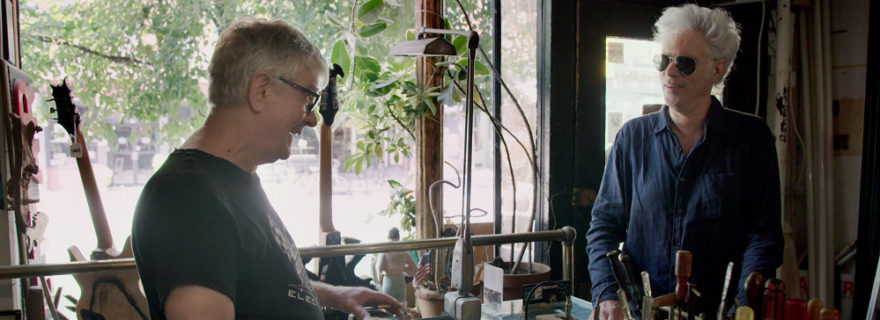Carmine Street Guitars
Movie Rating:
4.5
Canadian documentarian Ron Mann has had a long career shedding light on various subcultures, from his celebrated Comic Book Confidential, examining a dance craze in The Twist, to stoners and growers in Grass. His latest, Carmine Street Guitars, borrows stylistically from Jim Jarmusch, who is a participant in the documentary, and Jonathan Demme, to whom the film is dedicated.
With this gentle, sweet film, we enter a world where a luthier and his apprentice craft tools used by exceptional musicians, forming a kind of calm bubble in the middle of New York’s Greenwich Village.
The main subject is Rick Kelly, a guitar maker who uses wood from historic buildings in the city as the basis for his craft. Based on the pioneering work of Leo Fender, he builds Stratocaster-like objects with wood that was cut hundreds of years ago, giving musical and historical character to the fine instruments. His protégé, Cindy Hulej, provides artistic flourish, adding arts-and-crafts adornments to the instruments, such as Led Zeppelin logos or the faces of the Traveling Willburys.
The film is far from some verité exercise in documentary purity. Its series of stagey vignettes and awkward question sessions lean more heavily on the likes of Jarmusch’s Coffee and Cigarettes than on a Fredrick Wiseman film. Yet when one becomes comfortable with this laconic style, it’s easy to get drawn in, particularly when the instruments themselves begin to be played.
A series of exceptional musicians such as Bill Frisell, Eleanor Friedberger, The Roots’ Kirk Douglas, and a mighty Charlie Sexton provide an on-screen soundtrack, bringing to life the results of the shop’s work. Each guitar has its own tone, and in the hands of these disparate musicians, each is allowed to tell a unique aspect of the art of this instrument.
The outside world is mostly told through errant voices recorded and played during the exterior shots. In a city where people are worried about their lattes and soul cycle appointments, there’s something particularly grand about this tiny storefront that maintains some of the character of the classic Village setting of the 1960s and ’70s.
Despite the incursion of real estate developers and a changing city, the shop endures, and thanks to Hulej, a new generation is taking up the art. It’s a bittersweet look at this kind of handmade world, where simply picking up the instrument and looking at the fretboard, or knocking on the side of a plank to know the musicality of the resulting instrument, is so easily lost in a world far more consumed with quick, easy, cheap imitators.
Deceptively simple, this is a film that captures in a truly fine way the technological wonder of turning a bar counter into an instrument, and the equally magical human trait of being able to not only produce music from such a thing, but to imbue what they’re playing with a little bit of their soul.
Carmine Street Guitars is highly nostalgic but it doesn’t suffer from a kind of ennui. Instead, it’s a celebration, a welcoming and warm introduction to this oasis where the expression is king, and the accoutrements are all there to bring about greatness in the right hands. Mann manages to lift this place into near mythic ways without ever overplaying his hand, showing for uninitiated or longtime patron alike the magic not only of Kelly’s shop, but all that it represents.





